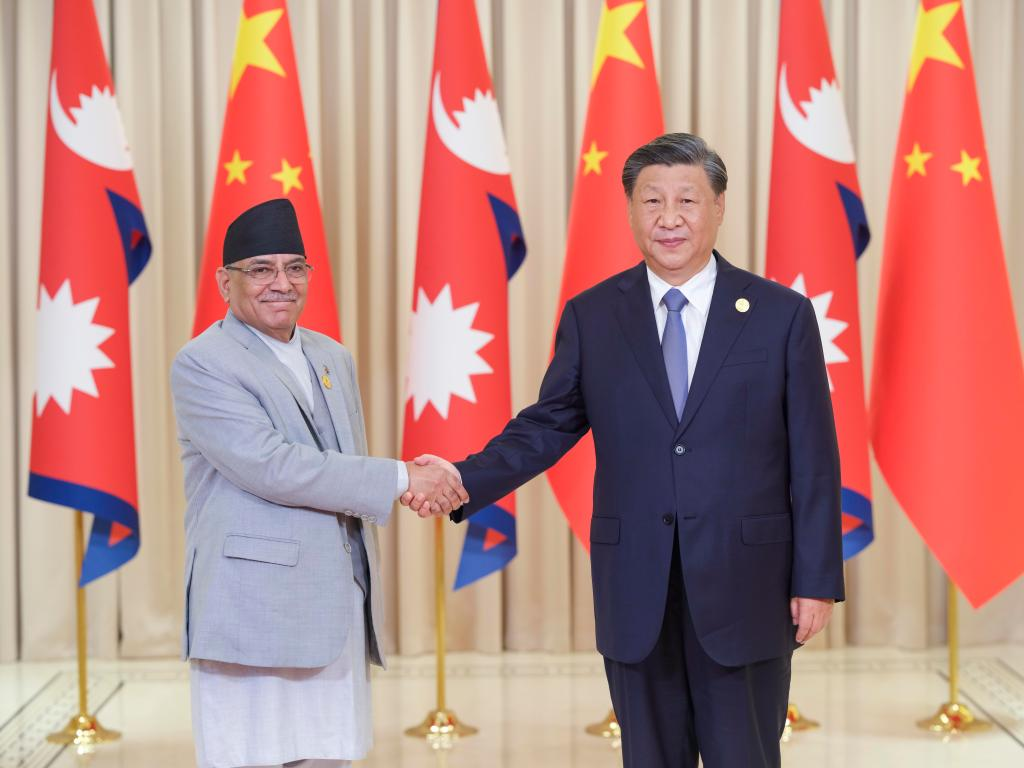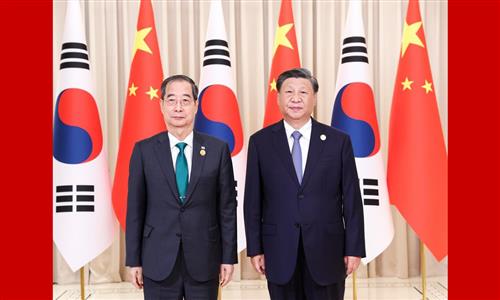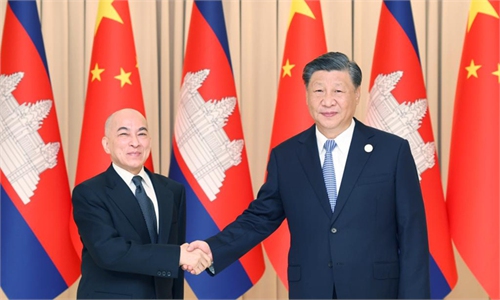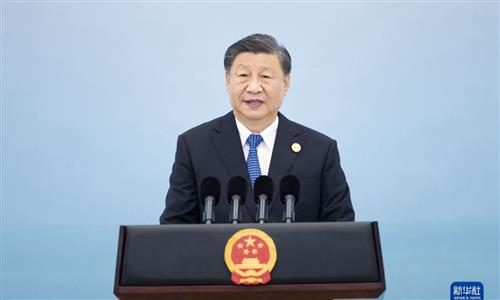
Chinese President Xi Jinping meets with Nepalese Prime Minister Pushpa Kamal Dahal Prachanda in Hangzhou, capital city of east China's Zhejiang Province, Sep 23, 2023. Photo:Xinhua
Chinese President Xi Jinping met with Prime Minister Pushpa Kamal Dahal Prachanda of Nepal on Saturday on the sidelines of the 19th Asian Games in Hangzhou. Xi appreciated the Prime Minister's commitment to promoting the development of friendly relations between China and Nepal and firm support for cooperation between the two countries in building the Belt and Road Initiative (BRI).
This is your first visit to China after your third term as Prime Minister of Nepal, and I am confident that it will yield fruitful results and provide new impetus to the friendly and cooperative relations between the two countries, Xi said.
China attaches great importance to China-Nepal relations, and is willing to strengthen its development strategy synergy with Nepal, deepen practical cooperation in various fields, enhance the exchange of experience in governance and promote new progress in China-Nepal relations, Xi said.
Experts noted that Prachanda's visit in China will further enhance the friendship between China and Nepal, and the two sides will achieve tangible cooperation in a number of areas including hydropower construction and people-to-people exchanges under the China-proposed Belt and Road Initiative.
As a country located between India and China, Nepal's diplomatic stance is to maintain a balance between the two countries, but it has to consider the reality that India views South Asia as its sphere of influence and cannot treat Nepal as an equal, some experts said.
"Due to those concerns, Nepal seeks to strengthen its relations with China to balance the influence of India. But unlike India, China does not ask Nepal to take sides between China and India. China treats Nepal as an equal, which India does not," Long Xingchun, a professor at the School of International Relations at Sichuan International Studies University, told the Global Times on Saturday.
Mao Ning, a spokesperson from Chinese Foreign Ministry, told the press conference on Thursday that Prime Minister Prachanda is carrying out an official visit to China from Saturday to September 30.
Prachanda has visited China many times and made important contribution to the growth of China-Nepal relations. During the visit, after meeting with President Xi, Chinese Premier Li Qiang and China's top legislator Zhao Leji will hold talks and meet with him respectively. The two sides will have an in-depth exchange of views on deepening traditional friendship, expanding mutually beneficial cooperation and international and regional issues of mutual interest, Mao said.
"The visit is also the first by Nepal's Prime Minister in three years of the COVID-19 pandemic, which is a strong boost to bilateral relations," Qian Feng, director of the research department at the National Strategy Institute at Tsinghua University, told the Global Times on Saturday.
Qian noted that the visit also demonstrated Nepal's willingness to ride the "express train" of China's development as Nepal ramps up efforts to boost its economy after of the pandemic. The two sides are expected to achieve fruitful cooperation results in fields like hydropower construction, infrastructure construction, environment cooperation as well as human exchanges, the expert said.
"The cooperation potential between China and Nepal is immense. Particularly through the BRI and the construction of the China-Nepal railway, China can offer Nepal more investment and industrial transfers than India can, thus fostering Nepal's economic growth," Long said.
Before the Nepalese Prime Minister visited China, 15 tons of turmeric powder was imported from Vietnam and brought to the Nepali capital of Kathmandu via the Tianjin port in northern China and the Zhangmu-Tatopani border point, a move that "represents the dawn of a new era" in bilateral trade relations.
"It signifies the beginning of a transformative journey toward enhanced economic cooperation, increased trade volumes and shared prosperity," Madhu Kumar Marasini, secretary of Nepal's ministry of industry, commerce and supplies, said at the commencement ceremony.
The transit arrangement "provides us with a crucial alternative trade route and diversifies our trade options, reducing our reliance on a single transit route," Marasini said.
"Nepal is also a beneficiary of the BRI, through which Nepal has become land-linked from a landlocked country," Qian noted.
The Pokhara International Airport, which the Chinese government helped build in Nepal, is a typical example. The project started in July 2017, and China provided a soft loan to Nepal for this project, which not only created a new model of development cooperation between the two countries, but also effectively guaranteed the smooth implementation of the project.
On January 1 this year, the airport was inaugurated. During the ceremony, Wang Xin, a counselor at the Chinese Embassy in Nepal, said that the new airport has become a symbol for China and Nepal to build the BRI together.
The new airport is not only an aviation hub that facilitates the movement of people between Nepal and China and other countries in the world, but also a friendship project that witnesses the true love and friendship and mutual assistance between China and Nepal, and has become a vivid practice and a powerful testimony to the building of a China-Nepal community with a shared future and the realization of common development and prosperity hand in hand, Wang noted.
Besides India, the US has been trying to strengthen its relationship with Nepal in recent years, particularly through the Millennium Challenge Corporation (MCC) program. But some experts said the US engagement in Nepal is opportunistic, and is chiefly aimed at containing China, rather than a long-term commitment to the South Asian country




